The SoilC4C – SoilCarbon4Climate Conference, co-organised by the 4per1000 Initiative and Germany’s Federal Office for Agriculture and Food, will take place in Berlin, Germany, 11-13 September 2025. The conference will explore pathways and solutions for soil carbon in temperate regions. The call for abstracts have been extended until June 10. Pre-registration is open until mid-August. For more information and to submit an abstract, visit conference website HERE.
In advance of the Council Meeting in Dublin at the beginning of June, we are pleased to release our second Annual Highlights Report celebrating the GRA. This is available to download and share. Check it out by clicking HERE.
The second issue of the Nitrogen Flagship Newsletter is out now!
This is now available to view below. Please click HERE for more information.
Livestock researchers from seven ASEAN countries and Uganda met in Phnom Penh last week to consolidate the best available information on measurement of livestock greenhouse gases (GHG).
The event, hosted by Cambodia’s RUA (Royal University of Agriculture) and facilitated by SEARCA (Southeast Asian Regional Center for Graduate Study and Research in Agriculture), was the culmination of recent investment in livestock GHG measurement by New Zealand in many of these countries.
The Cambodian workshop distilled the experiences and expertise of participants, to be used as reference by current and future users. Outputs included national summaries of equipment available in their countries, best practice guides on use of these systems, and training videos on the key component and procedures.
Through its Climate Smart Agriculture Initiative, New Zealand has sought to strengthen national GHG inventories for livestock as well as pioneer GHG measurement and mitigation options in 6 ASEAN countries. This includes setting up new livestock methane measurement facilities.
See full article here.
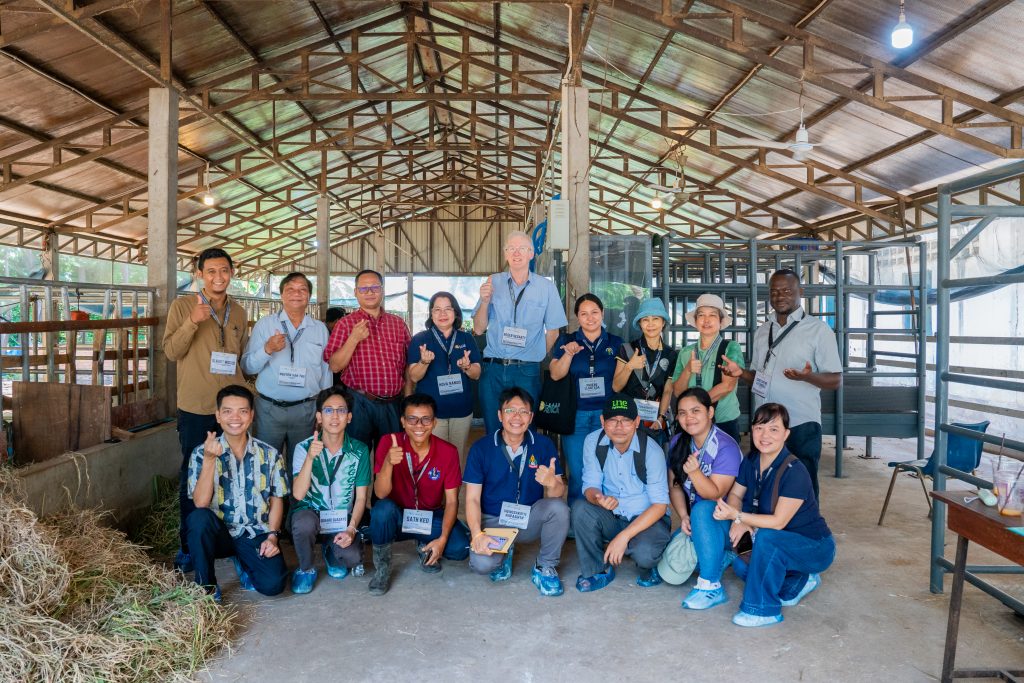
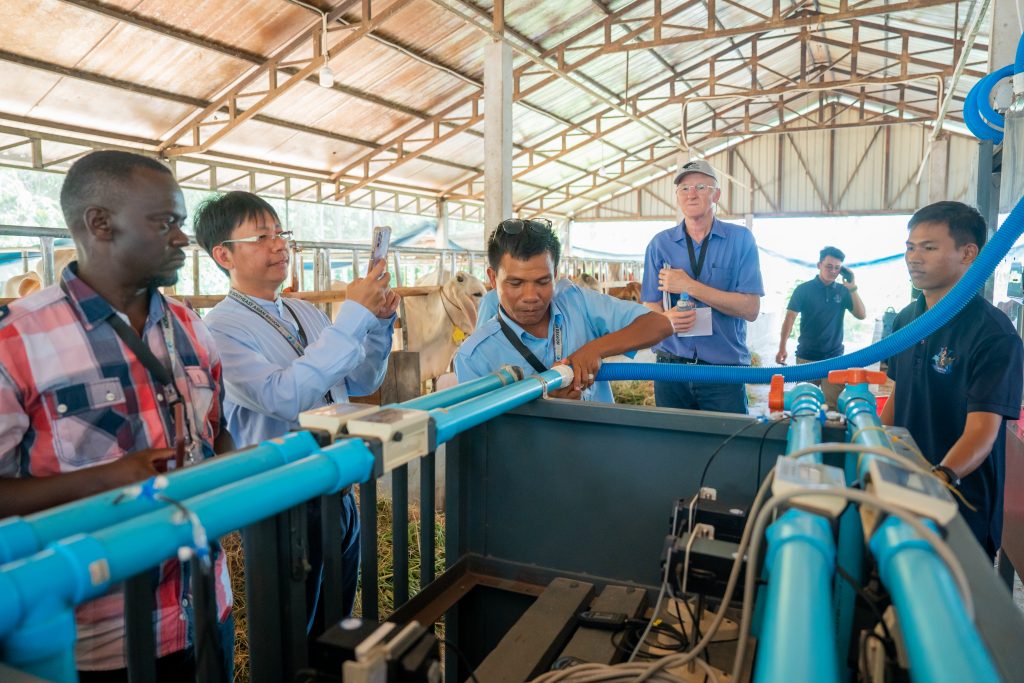
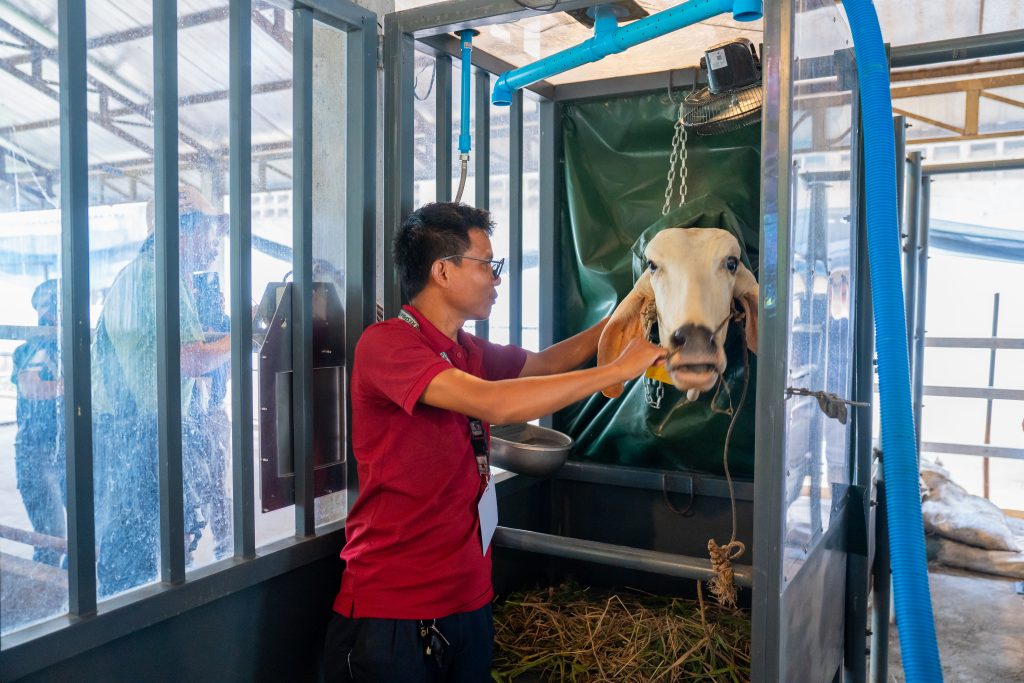
Closing Date : 11 August 2025
Location : UPPSALA, Sweden
Professor in terrestrial ecosystem ecology
Faculty of Natural Resources and Agricultural Science
Department of Ecology
The Swedish University of Agricultural Sciences (SLU)
The subject area covers integrated studies of biotic and abiotic components in terrestrial ecosystems, especially modeling of ecological processes that drive the flows and storage of carbon and nutrients.
A recording of the Flagship Webinar: “Nitrogen mineral fertilisers, updates on methodologies and relevant work for inventory improvement” webinar is now available to view HERE.
This webinar is aimed to researchers, students and the general public interested in the use of different methodologies to quantify nitrous oxide emissions and ammonia volatilization from agroecosystems, their advantages, and challenges for their implementation. We will also touch on how to use the information generated for national inventories improvement, and we will also provide an update on the development of the N flagship from the GRA.
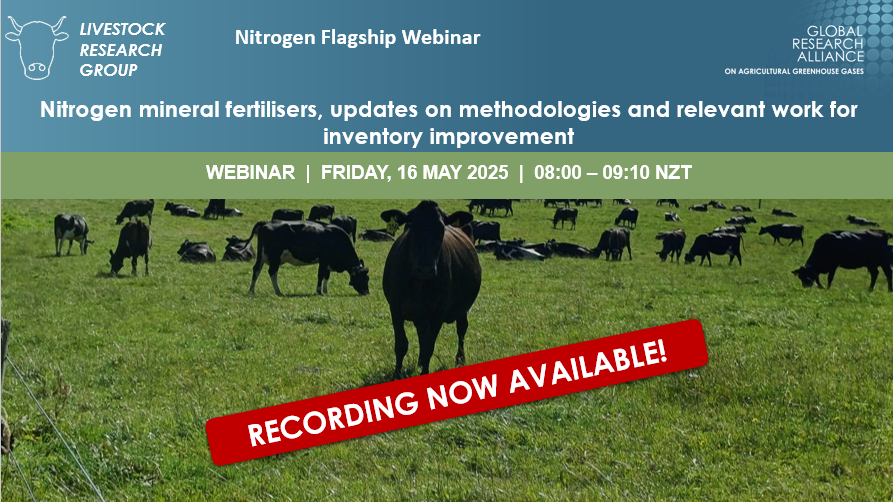
From 24 to 28 February 2025, the Global Research Alliance on Agricultural Greenhouse Gases (GRA) co-organised an international training course hosted by CIHEAM Zaragoza: “Cattle breeding for low methane emissions: from farm measurement to genetic progress.” The course was part of the Horizon Europe Re-Livestock project, “Facilitating Innovations for Resilient Livestock Farming Systems.”
The course was delivered in collaboration with the Mediterranean Agronomic Institute of Zaragoza (CIHEAM Zaragoza), the Basque Institute for Agricultural Research and Development (NEIKER BRTA), Wageningen University & Research (WUR), and the Spanish National Institute for Agricultural and Food Research and Technology (INIA-CSIC).
The GRA contributed to both the organisation and delivery of the training, which brought together international experts and participants to explore strategies for reducing methane emissions through cattle genetics and breeding practices. Roel Veerkamp (WUR) and Hayden Montgomery (Global Methane Hub) opened the course with a joint lecture, while experts Birgit Gredler-Grandl and Coralia Manzanilla-Pech led programme design and practical sessions.
For highlights and additional information about the course, please visit the Re-Livestock project website at https://re-livestock.eu/2025-wp8-communication-dissemination-and-capacity-building-update/
The GRA thanks all partners and contributors for a successful and impactful training week.
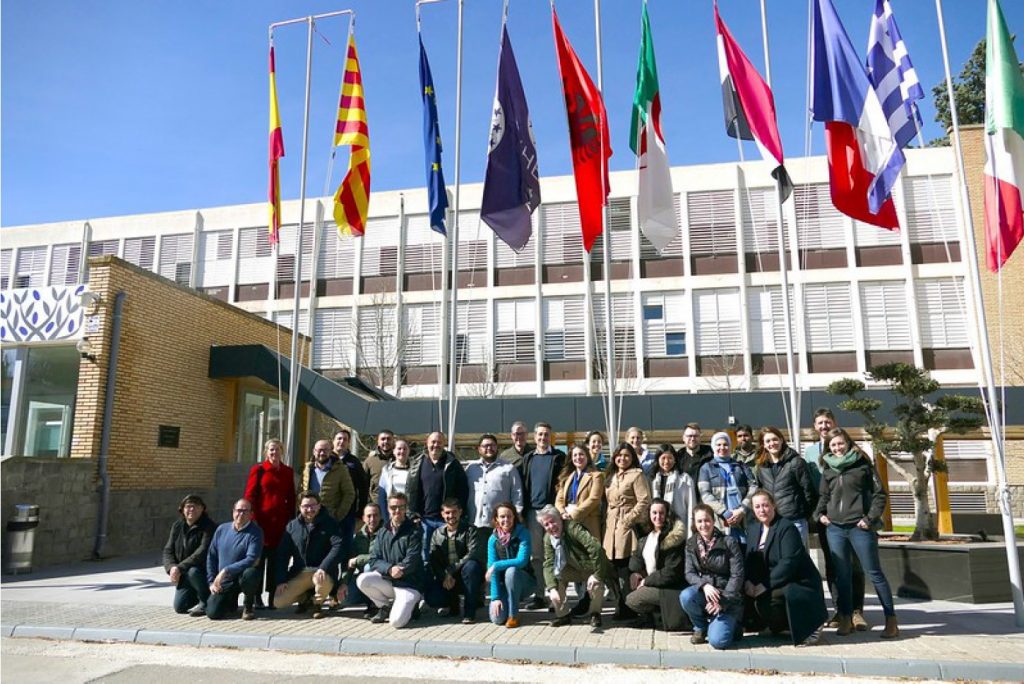
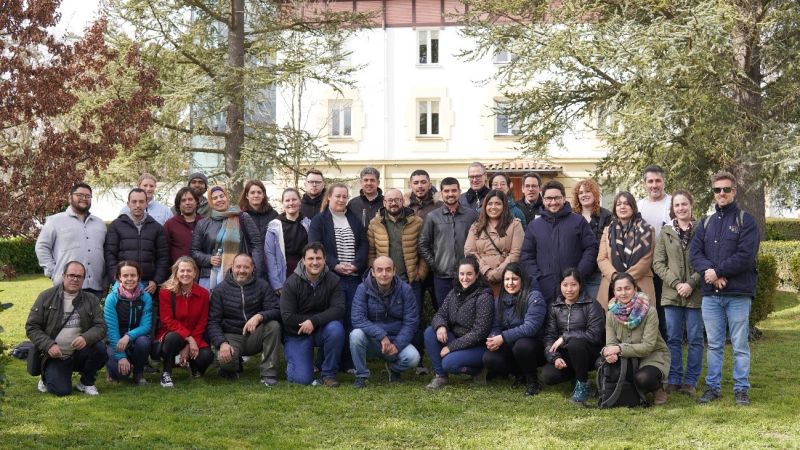
Livestock Research Group / Manure Management Network webinar recording available HERE!
This webinar includes three presentations about the measurements and use of the B0 also called biological methane potential (BMP). This includes a presentation of the problems in measuring B0, how B0 is used by IPPC protocols to calculate methane emission from stored liquid manure and risk of incorrect emission estimates due to incorrect B0. The variation in B0 as related to manure categories and composition will be presented using data from a large Danish dataset.
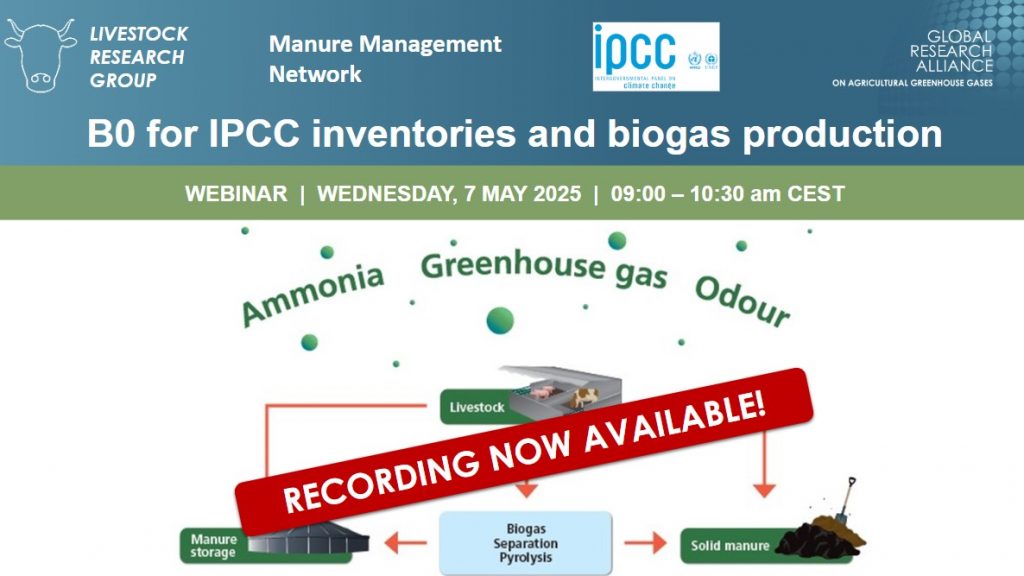
Apply Now!
FAO is launching a special recognition to spotlight best practices and outstanding innovations in Sustainable Livestock Transformation, One Health, Animal Health and Reference Centres, as a part of the FAO 80th anniversary celebration.
This initiative will highlight impactful and scalable solutions across the livestock sector that support more efficient, inclusive, resilient, and sustainable agrifood systems.
FAO will recognize practices and innovations that have led to significant advances in areas such as:
- Sustainable Livestock Transformation
- Animal Husbandry, Genetics, Feed and Welfare
- One Health
- Animal Health
- Antimicrobial Resistance (AMR) Solutions
- Reference Centre Contributions
Eligible applicants include institutions, international and regional organizations, academic and research institutions, civil society groups, and private sector entities. Submissions must demonstrate successful implementation at scale and present technologies, systems, or approaches that enhance efficiency and support the sustainable transformation of livestock value chains.
Selected entries will be formally recognized during the Global Conference on Sustainable Livestock Transformation (29 Sept–1 Oct 2025), with additional visibility at the World Food Forum (13–17 October 2025) at FAO headquarters in Rome.
Submission deadline is 15 June 2025.
Nominations must be submitted via the official online form.
We invite you to share this opportunity with your networks and encourage eligible entities to submit their applications.
Learn more here.
The FAO Livestock Recognition Team
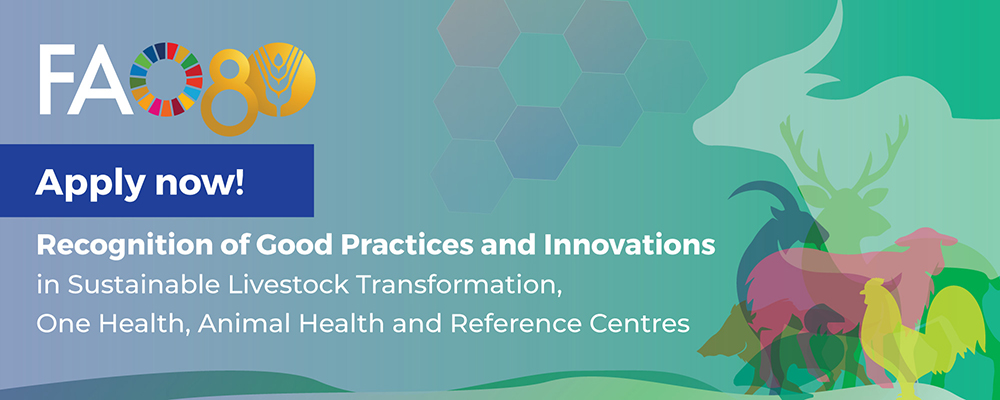
The New Zealand Climate Smart Agriculture Initiative (NZCSA) is excited to share some videos highlighting their work.
The NZCSA provides practical support to developing countries in Africa, ASEAN, Latin America and the Caribbean with a strong focus on capability, capacity, and the infrastructure needed to effectively account for agricultural emissions. It is part of New Zealand’s actions in support of the GRA.
The Systems Microbiology & Natural Products Laboratory (www.HessLab.com ) at UC Davis will be hiring several additional postdocs in the next 12 months.
The new hires will work on different aspects of rumen microbiology with emphasis on:
• isolation, cultivation and metabolic engineering of methanogens and acetogens
• hydrogen and carbon flow during anaerobic digestion/fermentation
• rumen fungi
Start dates are negotiable – opening great opportunities for students who are graduating in the next 12 months.
Potential candidates can reach out directly to Dr. Matthias Hess (mhess@ucdavis.edu ) or his lab manager Dr. Saumya Wickramasinghe (swickramasinghe@ucdavis.edu ).
Closing Date: 31 May 2025
Location: Talence, France
In the context of the ANR-funded project H2Rumen (https://lnkd.in/eEJHUf25 ) coordinated by Rafael Muñoz-Tamayo, we are hiring a postdoctoral researcher in the Pleiade team of Inria in Bordeaux, France, to work on an exciting project in systems biology and metabolic modelling.
 A dynamic research environment, benefit from interdisciplinary collaborations, and receive supportive mentoring!
A dynamic research environment, benefit from interdisciplinary collaborations, and receive supportive mentoring!
 Location: Inria centre at the university of Bordeaux (Talence, France)
Location: Inria centre at the university of Bordeaux (Talence, France)
 ️ Start date: Fall 2025 (flexible)
️ Start date: Fall 2025 (flexible)
Duration: 18 months + 14 months in Paris-Saclay
 Candidate profile:
Candidate profile:
– PhD in systems biology, bioinformatics, applied mathematics, or related field
– Strong background in modelling (metabolic networks, ODEs…)
– Proficiency in Python, or equivalent
– Interest in interdisciplinary work and integration of biological data
 Application online https://lnkd.in/enmaaYe6
Application online https://lnkd.in/enmaaYe6
 More info here: https://lnkd.in/ejDrRa-i
More info here: https://lnkd.in/ejDrRa-i
